Published Nov 21, 2018
50 Years Later: "Plato's Stepchildren"
50 Years Later: "Plato's Stepchildren"
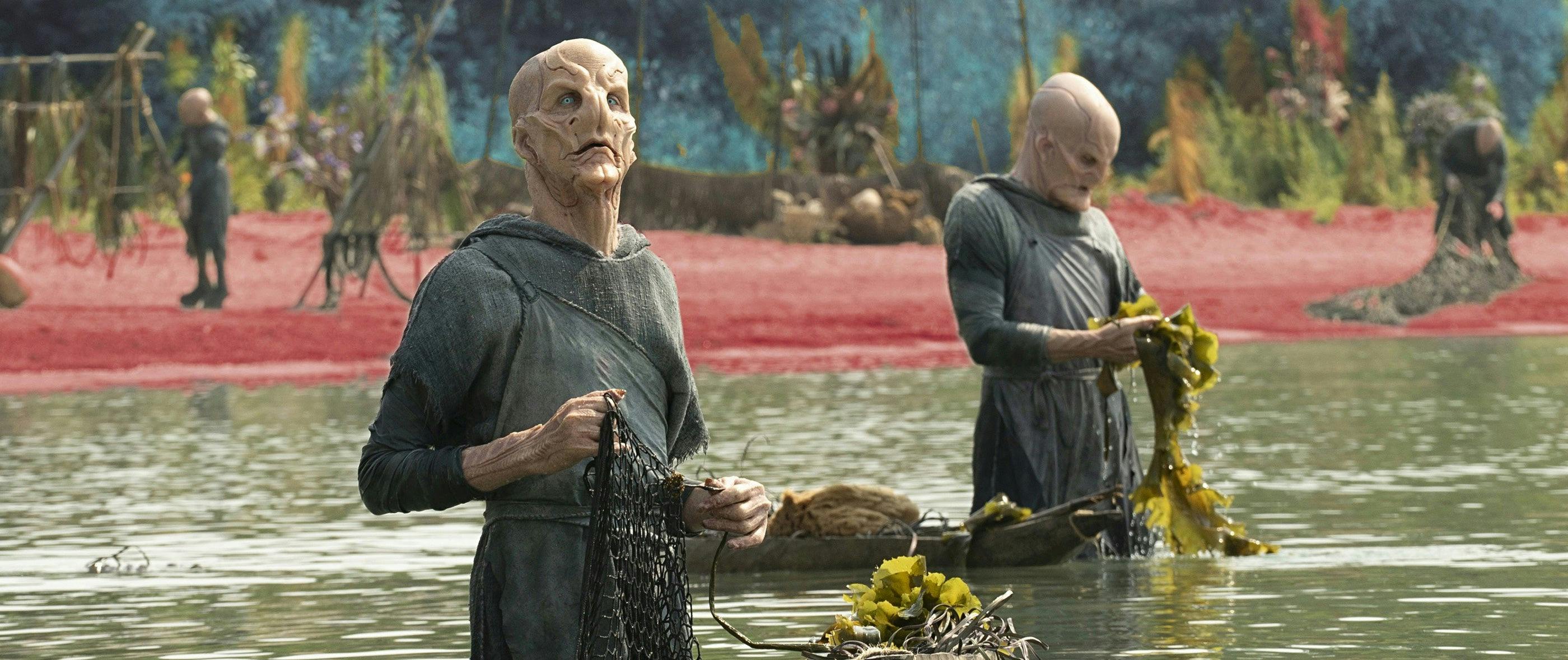
Let’s just get this out of the way: “Plato's Stepchildren” is far from the best Star Trek episode ever made. In fact, it is fairly offensive on a few levels and especially so from my usual feminist point of view. It is counted among “groundbreaking” Star Trek episodes due to the interracial kiss between Captain Kirk and Uhura, even though a quick Wikipedia search confirms that this moment came from other television programs right around the same time period. With the advent of the internet and proliferation of information, the claim of “first interracial kiss” is perhaps a bit inflated. Star Trek, of course, remains groundbreaking on numerous levels, but in my re-watch on the eve of this episode’s 50th anniversary, I think there are many other aspects of the episode worthy of discussion.
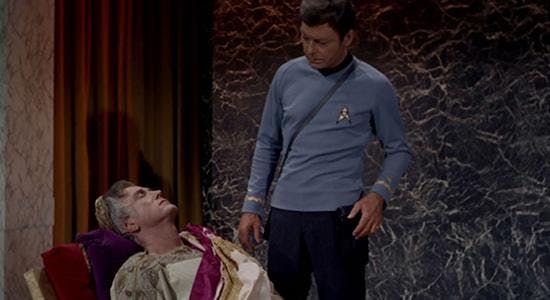
The strange group marooned on this odd little planet are several thousand years old and spend most of their time meditating and engaged in Platonic debate. They’ve lost resistance to any bacteria and are thus susceptible to deadly infection from the smallest of cuts. Hence, they need a doctor like Bones to step in and help when their leader, Parmen, becomes gravely ill. After he recovers, Parmen returns to what we assume is his usual tyrannical demeanor and insists that Bones remain on the planet and abandon his Enterprise post. Of course, Bones refuses and Parmen compels him to stay by torturing Kirk, Spock, and eventually Uhura and Nurse Chapel with his telekinetic and “psionic” abilities. The society’s only person to not possess these abilities is Alexander, a dwarf/little person who functions as a court jester-type figure.
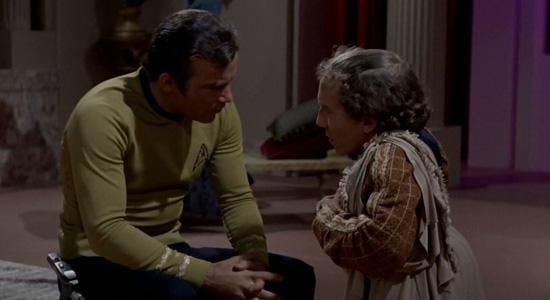
A line I found quite good and very “Star Trek” is when Alexander expresses desire to be an equal in his society and asks Kirk how many of his people have these powers that Alexander does not. Kirk tells him, “Where I come from, size, shape, or color does not matter. And no one has the power.” Alexander is understandably delighted to hear this, and the viewer can’t help but wistfully yearn for the utopian world Starfleet embodied in the 1960s. I imagine hearing that during the tumultuous socio-political times in which it aired would be very inspiring, and it remains inspiring today since we are far, far from a society in which all are equal and power is shared.
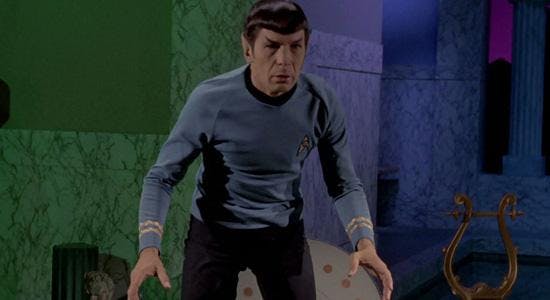
While much is made of Kirk’s torture in particular, I personally think Spock’s torture and reaction to both himself and his crewmates being tortured are much more compelling. A “punishment” for Spock via Parmen is forcing him to express emotion – first intense laughter and then what appears to be crippling sadness. Spock is clearly affected by it, as afterward he crushes a clay bowl with his bare hands while noting that to express his true rage would be quite terrible indeed. Personally, I’d like to see Spock open a can of whoop-ass on these sadistic jerks, as it’d be incredibly satisfying.
Star Trek, however, rarely gives in to these baser instincts and takes the higher, intellectual road – no exception made in this episode. However, in fighting a highly intellectual society that can die from a mere cut, I wouldn’t be so high-minded as Kirk, Spock and McCoy. Wouldn’t it be hilarious if one of them busted out a safety pin or something equally small and nonthreatening, and poked Parmen with it?

While the forced kiss between Kirk and Uhura is more often discussed, I think the Spock-Chapel kiss deserves greater attention. After all, there’s no real emotional connection between Kirk and Uhura other than that of respectful colleagues and, in contrast, we know that Chapel pines for Spock. (And who wouldn’t? Nimoy is a dashing, thinking woman’s sex symbol!) Before they kiss, Chapel remarks that she’s wanted to get close to Spock, but to have this affection forced upon them both disgusts her. It’s a violation and an assault that Parmen carries out on both of them equally (as well as upon Kirk and Uhura). I appreciated Chapel’s line. Fans may have “shipped” her and Spock, but them getting together would not have been in character for him. I only wish we’d gotten to spend more time with Chapel as a character and see her do more – but that’s my wish for every female TOS character.
One moment I disagreed with was that Kirk was ultimately the Starfleet crewmember to display and use telekinetic abilities as a result of Bones’ fast-acting concoction. After his emotional torture, it would’ve been great to see Spock take the high road and deliver the closing speech to Parmen before they flee that dreadful planet without so much as a backward glance. Even Bones, the one being coerced into staying, would’ve made a great choice to stand up to Parmen with a display of mental force. Kirk is always at the center of the action, and since they were fighting a mental battle, I’d have liked to see the two more-intellectual members of the trio handle the final showdown. Can you imagine everything swirling around the room as an expression of Spock’s internal rage before he finally decided to spare Parmen’s life? Any moment in TOS that depicts Spock’s inner conflict is a win for Nimoy and the storytelling.
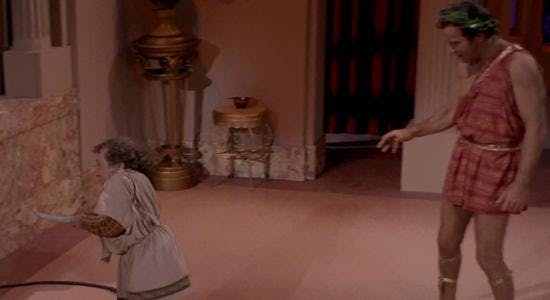
One moment that I was glad to see play out was when Alexander chose to listen to Kirk’s warning to not “be like them” in potentially stabbing Parmen before he ultimately abandoned revenge in favor of leaving along with the crew.
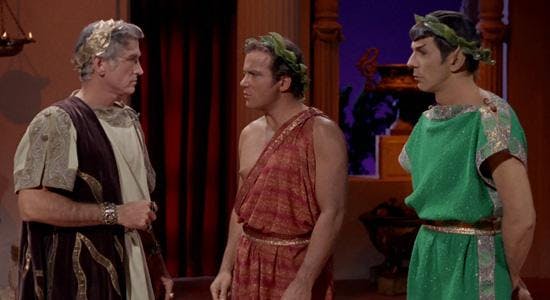
Two other elements were… something else: Spock sings a short romantic melody and the outfits in the final scene (tiny short kimonos and sparkly gold gladiator sandals for the guys!) are simply next-level silliness that only 1969 can pull off.
Thus, while “Plato’s Stepchildren” leaves much to be desired, it still delivers several classic Trek moments -- and memorably campy costumes.
Amy Imhoff is an author, digital media specialist, convention panel host, and sometimes professor who specializes in women’s representation in media. She has appeared on numerous Star Trek podcasts and is featured in “Outside In Makes It So,” a collection of Star Trek: The Next Generation essays available from ATB Publishing. Amy lives outside NYC with her husband, two silly cats and various geeky collections.

